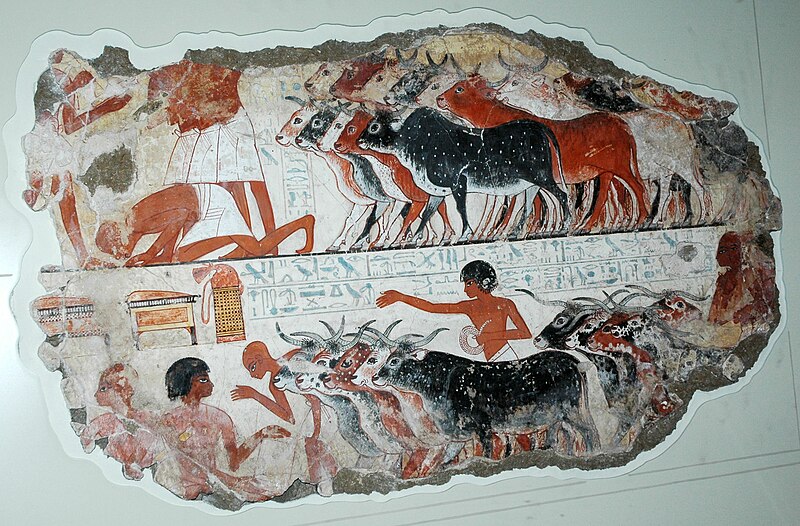Maybe let's start from the beginning.
Jews are one of Semitic-speaking peoples, who (Semites as a whole - not Jews) are believed to have originated ~6000 years ago. Today there are two main theories as to the place of origin of Proto-Semites - either Eastern Levant or Western Mesopotamia (they are actually in close proximity to each other). The earliest attested Semitic language was Akkadian, spoken by people who conquered Sumerians and founded the Akkadian Empire.
There are two theories regarding the relationship between Akkadian language and other Semitic languages - one of them says that all other Semitic languages originated from groups of Akkadian-speakers who migrated west from Mesopotomia into Levant, the other theory (which assumes that Semitic languages originated in Eastern Levant, not in Western Mesopotamia) claims that those Proto-Semites who migrated east became Akkadian-speakers and Eblaite-speakers, etc. (Eastern Semites), while those who migrated west and south formed other Semitic languages (Central Semites and Southern Semites). Of course the 2nd theory doesn't exclude the possibility that some of Non-Akkadian Semitic peoples could have originated from Akkadian anyway.
Semitic migration to Palestine (or rather Western and Southern Levant in general) was not a single event, but it took place in at least 3 major waves of peoples migrating from the east (from Eastern Levant or from Mesopotamia) arriving to the same place and overlapping with previous Semites who had migrated there before.
The Biblical story which says that Abraham was born in Ur is of course a legend and we don't know whether it is true or not, but undoubtedly it reflects the eastern origin of Hebrews (Israelites) and the fact of their migration from the east is true. It should not be surprising anyway that various groups of people were migrating from Mesopotamia to other places, considering that Mesopotamia was the most densely populated area in entire Western Eurasia at that time.
Theory about Eastern Levantine origins of Proto-Semites and their early divergence for Eastern Semites (mostly Akkadians) and others - of whom Akkadians migrated east and others migrated mostly west and south - is probably the correct one, but - as I wrote - it doesn't exclude the Mesopotamian origin of Hebrews.
That early divergence of Semites took place shortly before the 1st wave of Semitic migrations to Palestine, while Hebrews arrived to Palestine much later - during the 3rd wave of Semitic migrations. This suggests that early on they could have indeed lived somewhere far away from Palestine, perhaps in Mesopotamia.
There are also written sources which seem to support Mesopotamian origins of Hebrews. One of them mentions the Habir peoples (could they be Hebrews? most probably yes) living in Mesopotamia, near the city of Ur, ca. 2750 - 2600 BC. Later sources mention such names like Habiri and Ibrim (could both or at least one of these names be Hebrews? most likely yes) migrating to Palestine during the 15th century BC, as part of the 3rd wave of Semitic migrations.
Then we have Egyptian sources mentioning some Hebiri (once again: most probably Hebrews) in Egypt during the 13th and the 12th centuries BC. Of course they were not building pyramids, because their presence in Egypt took place centuries after the end of "pyramid-building movement" (according to the link posted below, the last of Egyptian pyramids were constructed in the 18th century BC - almost 500 years before the beginning of Hebrew presence in Egypt):
http://www.ancientegypt.co.uk/time/explore/pyr.html
After settling in Palestine, Hebrews mixed with local peoples - other Semitic tribes who had arrived there before them (as I wrote, Semitic migrations started at least 5500 years ago, while Hebrews first visited Palestine only around 3500 years ago, and ~3300 years ago visited Egypt, just to come back to Palestine some 3100 to 3050 years ago). Even the Bible gives examples - grandmother of King David was an ethnic Moabite. So when Jews emerged as a nation (and they emerged as such perhaps only in their own kingdom* - established in year 1020 BC), they were no longer descendants of just Hebrews alone. They also assimilated or absorbed many other Semitic tribes. Among tribes absorbed by Hebrews / Israelites - and thus taking part in ethnogenesis of Jews - were for example Kenites, Rechabites, Kenisites, etc. They were also intermarrying with Edomites, Egyptians, Moabites, etc. And Moses even had an Ethiopian wife. Only centuries later Jewish laws concerning marriages of Jews with Non-Jews became much more restricted. But already at that time, Jews were a mix of many tribes.
*But already before establishing a kingdom (1020 BC), Jews had been a loosely united tribal union:
It consisted of many tribes, both with immigrant Hebrew and local Non-Hebrew background:
http://en.wikipedia.org/wiki/Confederated_Tribes_of_Israel#Main_text
So ethnogenesis of Jews took place in Palestine, even though one of major parts of their ancestors - Hebrews - migrated to Palestine from other places.
As for the Hebrew language - it belongs to Canaanite subdivision of Semitic, which included for example Hebrew and Phoenician. Canaanite subdivision - together with Aramaic, Ugaritic and Amorite subdivisions - were parts of Northwest Semitic languages, which were parts of Central Semitic languages:

Amorites had migrated to Western Levant long before Hebrews and founderd the Kingdom of Yamhad:
http://en.wikipedia.org/wiki/Yamhad
http://en.wikipedia.org/wiki/Semitic_people#Semitic-speaking_peoples
Yes, Judaism did evolve from Canaanite religion, but at the beginning they most probably worshipped many gods. It evolved from Polytheism through Monolatrism (recognizing the existence of many gods but believing that only one is the chosen god worth worshipping) to Monotheism.
==============================================
One of variants of the theory about Eastern Levantine origin of Semites ca. 6000 years before present:
http://www.ncbi.nlm.nih.gov/pmc/articles/PMC2839953/






 Actually Jewish texts complain that they started to become culturally Egyptianized, and started to abandon the amazing shepherd culture of their ancestors:
Actually Jewish texts complain that they started to become culturally Egyptianized, and started to abandon the amazing shepherd culture of their ancestors:
